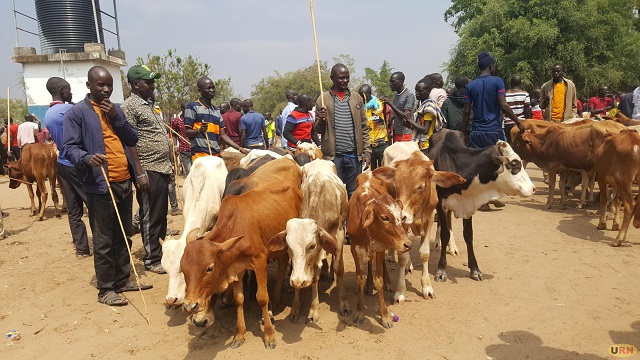
Agago, Uganda | THE INDEPENDENT | At least 179 cows have died of several cattle diseases in Agago district in the past six months. Among the diseases causing mass cattle deaths is the Contagious Bovine Pleuropneumonia (CBPP) which has affected 3,842 animals and killed 111 so far.
CBPP is a respiratory infection of cattle that is common in sub-Saharan Africa. The disease is transmitted through contact between an infected and a susceptible animal, which becomes infected by inhaling droplets disseminated by coughing.
The disease, which affects animals of all ages, presents with loss of appetite, fever, and respiratory signs such as rapid respiratory rate, cough, nasal discharges, and painful, difficult breathing. Animals that die of the disease present with yellowish coverings on the lungs. The disease also causes the infected animal to lose productivity in animals due to the high mortality and morbidity rates.
The disease can only be prevented by slaughtering and burning the carcass of the infected animals to avoid further spread because even when treated, cattle can remain disease carriers. Robert Kenny Okwera, the Acting District Veterinary Officer, they have received numerous complaints from livestock owners since July 2024.
Reports from the Agago district veterinary office show apart from the CBPP, the heart water disease has affected 14,261 animals and killed 63. Trypanosomiasis has infected 715, with no deaths, and worm infections have affected 417 and killed five animals.
Okwera explained that the sub-counties most affected are those near the border with Karamoja because they are surrounded by savannah vegetation that breeds disease-causing flies, that are carried by wild animals such as elephants, that inhabit the vast land and also invade the human settlements.
Some of the sub-counties with community kraals are Laperebong, Adilang, Laimuttu, Lapono, Paimol, Ajali, Lira Kato, Lokole, Omot, Omiya Pachwa, and Parabongo. Okwera noted that too much deposit of dung in the community kraals has also made the animals lose weight because they cannot lay down to ruminate, making them weak and susceptible to diseases.
“Coupled with the heavy rain, most of the kraals, especially the protected kraals have got serious mud which is also affecting animals,” he said. Okwera said a team of veterinary officers from the Virus Research Institute in Entebbe has picked samples from the animals in Adilang and Omot Sub Counties for further investigations.
He requested the Ministry of Agriculture Animals Industry and Fisheries, and all partners to help in the distribution of the required vaccines and drugs to farmers whose animals are crammed in the community kraals. Benson Ogwang, a resident of Karenga Village in Lapono Sub County, is worried about the rapid animal deaths, which he said is affecting one of their major sources of livelihood.
“We are buying drugs to treat the animals but they are still dying. We appeal to the government for support,” Ogwang said. Ogwang said the animals help them with garden work and income to cater to their other needs. “Livestock keeping contributes a lot to our local economy. If you do not have animals, your children cannot go to school. You cannot open large farmland,” he added.
Some farmers are threatening to withdraw their animals from the community kraals if the situation is not contained. In 2021, local leaders in Agago advised livestock farmers to keep their animals in communal kraals to safeguard them from rustlers, but locals say it is costing them a lot more.
This is the second time livestock owners in Agago are reporting a mass loss of animals to diseases because of keeping them in community kraals. From July 2022 to January 2023, more than 370 animals in the district died of CBPP. However, James Nabinson Kidega, the Agago Resident District Commissioner, appealed to the cattle owners to be patient to keep their animals in the kraals, so that they are quickly attended to.
In a letter dated September 16th, 2024, the RDC wrote to the Ministry of Agriculture, Animal Industries and Fisheries requesting 65,000 doses of CBPP vaccines, 30,000 doses of PPR vaccines, and 65,000 doses of vaccines against lumpy skin. Kidega pledged to call an emergency security meeting on September 23rd, 2024 together with the relevant authorities such as the chairpersons of sub-counties and the veterinary officers, and form a committee to help handle the situation.
*****
URN
 The Independent Uganda: You get the Truth we Pay the Price
The Independent Uganda: You get the Truth we Pay the Price


